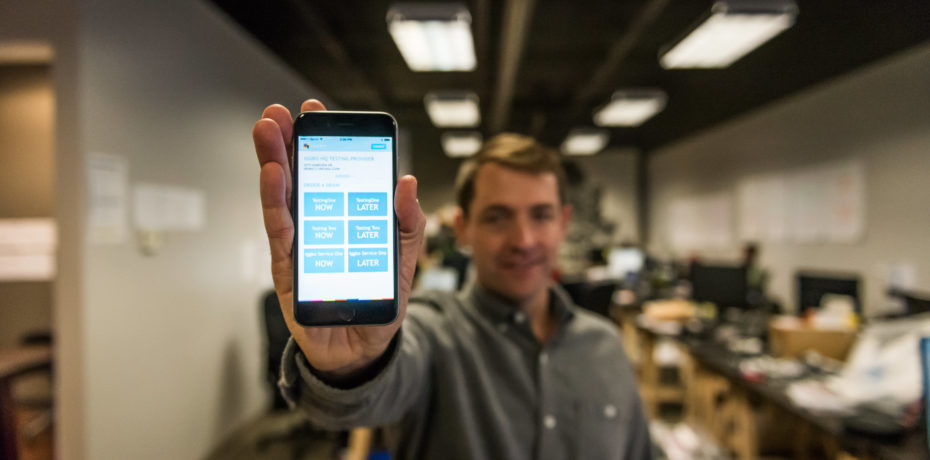CapTech Ventures wrote the book on iPhone and iPad development, and that’s literal: iOS Network Programming, authored by three of the Richmond information technology company’s developers, is available on Amazon for $30.


This year will be the sixth with mobile devices as we have come to know them-mostly touchscreen, filled with colorful apps, the phone service itself an afterthought. The rise of the mobile device has created new service lines for Greater Richmond’s technologists, who are preparing for 2013’s mobile trends and are facing, it seems, many of the opportunities and challenges of peers in bigger metro areas. Moreover, the need for more secure, private messaging and browsing has led to a rise in people looking to buy devices similar to a pgp phone (or “pgp telefoon kopen” as it’s said in Dutch) that provides layered encryption and guaranteed security. This trend has pushed developers to build more secure apps and platforms that caters to the needs of consumers.
Biggest hurdle? Staffing.
“Staffing in Richmond for mobility is still challenged,” says Joel Erb, the head of INM United, a digital strategy group headquartered in one of Greater Richmond’s more pioneering spaces: 201 W. Broad St.
While things are improving, the region still needs more companies that have in-house developers. You can find such math and science-heavy muscle in topnotch, local shops like INM, CapTech, Ironworks Consulting, or Mobelux. Even though the region boasts a handful of development shops that are the best in the country, mobility is still a very new thing in Greater Richmond.
CapTech has roughly 70 mobile developers, all of whom have been groomed through an internal boot camp program to ramp them up to the company’s stringent quality standards. The company recruits from Virginia and North Carolina universities- “wherever we can find them,” Williamson says.
When it comes to attracting the unique skill sets required, many cities have difficulty finding the type of professionals they need floating around. Those who are-freelance contractors-are likely already taken. “Whether it’s Android or iOS, you find the junior developer who’s been interested in dabbling on the side, or you find someone who has a ton of experience but they’re either locked up in a company and may not be doing work they’re passionate about, or they’re contractors and they’re only one guy so it’s very hard to bring them in on staff.”
There is hope as the talent market improves, and it comes just in time for a barrier that Erb says is fast approaching: People want to buy stuff on their device and pay for it on a phone, but that requires a seamless online ordering and payment system. When mobility begins integrating with other systems inside a company-such as an online ordering platform, a financial institution’s online banking system, or a retailer’s mainframe database-it requires more than just nice-looking graphics. Most banks have this covered providing an online and mobile banking platform that allows customers to interact with businesses through their credit cards. It also allows businesses to experience transactions without issue. There are various examples of what is offered to view online.
CapTech works with Fortune 500 companies that care more about security and function over form. “All the consumer banking apps that touch a lot of mainframe systems have to be secure and certified and meet regulations and all those things,” Williamson says. “There’s a lot that goes into it. We’re building mobile apps that need to be industrial strength and need to fit within corporate firewalls. We’re building architecture, not just things for the App Store.”
The companies that require either a mobile version of their website or an app that does something cool are only now getting around to making them. Just like the need for a company website in the late 1990s, tech consultants are serving as hand-holders with clients to help walk them into the mobile future.
“Companies are just starting to be prepared for mobile,” says Rick Whittington, head of his namesake consulting firm. “All companies at this point should be thinking of mobile strategies, and most of the companies that we work with are not mobile-ready.”
Johnny Hugel, a producer at Mobelux, adds to that: “Our experience has been that many businesses continue to think of mobile as a secondary technology that can just be added on to an existing product, when it should be regarded as a primary platform when developing a business and technology strategy.”
Whittington has seen an increasing number of client projects focusing more on websites built with “responsive design,” which means they are able to adjust to the size of the screen no matter the device. Responsive design is an attractive option for many companies because it offers a future-proofed device-unrestricted mobile version of the website without the need to invest in a stand-alone application or stripped-down mobile version of a website.
Whittington notes about 10 to 25 percent of traffic is inbound to his clients’ websites via a mobile device. That figure is still moving upward but is starting to plateau, he says, which makes sense, as almost every American who is going to own a smartphone or tablet has got one.
Overall, developers say, Greater Richmond should continue to promote its technologists just as it promotes the region’s creative prowess. When businesses can’t find the people they need, they go elsewhere. By keeping businesses here, we can continue to attract top talent in RVA, concludes Erb.

